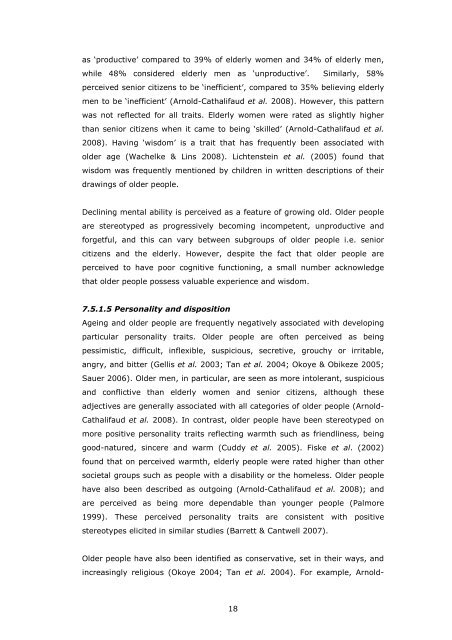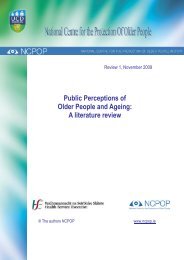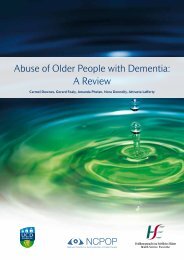Public Perceptions of Older People A literature review
Review 1 PP OP.pdf - National Centre for the Protection of Older ...
Review 1 PP OP.pdf - National Centre for the Protection of Older ...
Create successful ePaper yourself
Turn your PDF publications into a flip-book with our unique Google optimized e-Paper software.
as ‘productive’ compared to 39% <strong>of</strong> elderly women and 34% <strong>of</strong> elderly men,<br />
while 48% considered elderly men as ‘unproductive’. Similarly, 58%<br />
perceived senior citizens to be ‘inefficient’, compared to 35% believing elderly<br />
men to be ‘inefficient’ (Arnold-Cathalifaud et al. 2008). However, this pattern<br />
was not reflected for all traits. Elderly women were rated as slightly higher<br />
than senior citizens when it came to being ‘skilled’ (Arnold-Cathalifaud et al.<br />
2008). Having ‘wisdom’ is a trait that has frequently been associated with<br />
older age (Wachelke & Lins 2008). Lichtenstein et al. (2005) found that<br />
wisdom was frequently mentioned by children in written descriptions <strong>of</strong> their<br />
drawings <strong>of</strong> older people.<br />
Declining mental ability is perceived as a feature <strong>of</strong> growing old. <strong>Older</strong> people<br />
are stereotyped as progressively becoming incompetent, unproductive and<br />
forgetful, and this can vary between subgroups <strong>of</strong> older people i.e. senior<br />
citizens and the elderly. However, despite the fact that older people are<br />
perceived to have poor cognitive functioning, a small number acknowledge<br />
that older people possess valuable experience and wisdom.<br />
7.5.1.5 Personality and disposition<br />
Ageing and older people are frequently negatively associated with developing<br />
particular personality traits. <strong>Older</strong> people are <strong>of</strong>ten perceived as being<br />
pessimistic, difficult, inflexible, suspicious, secretive, grouchy or irritable,<br />
angry, and bitter (Gellis et al. 2003; Tan et al. 2004; Okoye & Obikeze 2005;<br />
Sauer 2006). <strong>Older</strong> men, in particular, are seen as more intolerant, suspicious<br />
and conflictive than elderly women and senior citizens, although these<br />
adjectives are generally associated with all categories <strong>of</strong> older people (Arnold-<br />
Cathalifaud et al. 2008). In contrast, older people have been stereotyped on<br />
more positive personality traits reflecting warmth such as friendliness, being<br />
good-natured, sincere and warm (Cuddy et al. 2005). Fiske et al. (2002)<br />
found that on perceived warmth, elderly people were rated higher than other<br />
societal groups such as people with a disability or the homeless. <strong>Older</strong> people<br />
have also been described as outgoing (Arnold-Cathalifaud et al. 2008); and<br />
are perceived as being more dependable than younger people (Palmore<br />
1999). These perceived personality traits are consistent with positive<br />
stereotypes elicited in similar studies (Barrett & Cantwell 2007).<br />
<strong>Older</strong> people have also been identified as conservative, set in their ways, and<br />
increasingly religious (Okoye 2004; Tan et al. 2004). For example, Arnold-<br />
18









